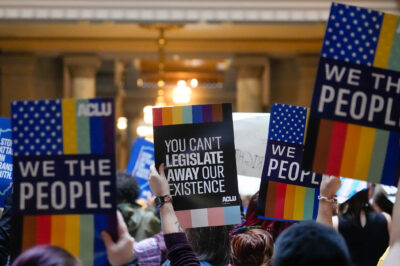
Is the Obama administration’s drone war legal?
Which ACLU affiliate continues to fight for transit equity 58 years after Rosa Parks was arrested for refusing to give up her seat on a bus to a white man?
In which state is the ACLU challenging an irrational and counterproductive state corrections policy on the segregation of HIV-positive prisoners?
How can you help ensure women in the military receive the same insurance coverage for abortion that is given to all other federal employees?
In which state did legislators lock protesters out of the state Capitol in order to push a revised version of the sweeping anti-abortion bill that could threaten to close women’s health centers?
VIDEO: On CNN, Nasser Al-Awlaki Demands “Accountability” for U.S. Drone Strike That Killed His Grandson
Speaking passionately in an interview with CNN’s Christiane Amanpour, Nasser al-Awlaki spoke on television for the first time about the drone strike that killed his 16-year-old grandson, Abdulrahman. The teenager, an American citizen born in Denver, was killed by a U.S. missile in 2011.
The legality of the Obama administration’s seemingly ever-expanding drone war was also discussed this week on NPR’s On Point program. Fake secrecy surrounding the drone campaign has stymied the ACLU’s efforts to get access to Obama administration documents about the strikes. ACLU Center for Democracy Director Jameel Jaffer has previously told the press this fake secrecy is “absurd”:
“It is preposterous. The assertion that this program is a secret is nothing short of absurd. For more than two years, senior officials have been making claims about the program both on the record and off. They’ve claimed that the program is effective, lawful and closely supervised. If they can make these claims, there is no reason why they should not be required to respond to [FOIA] requests.”
Remembering the Legacy of Rosa Parks
On December 1, 1955, Rosa Parks was arrested for refusing to give up her seat on a bus to a white man. It took courageous organizers – like Parks, and thousands of others – and a national movement to shift our laws and policies toward racial justice.
But today, people are still fighting for a seat on the bus.
Now, instead of signs and bus drivers segregating white and black riders, governments make transportation decisions that can create or even worsen the racial and economic segregation of a city. The ACLU of Wisconsin has been involved in advocating for transit equity for Milwaukee residents for years.
Living with HIV in an Alabama Prison
Albert Knox found out he was HIV-positive while he was in prison in Alabama, a state where prisoners like Knox are segregated because of their disease and barred from a host of rehabilitative and vocational programs offered to other prisoners.
Segregating prisoners living with HIV is a holdover from the earliest days of the HIV/AIDS epidemic in the 1980s. Back then – when transmission risks weren’t fully understood, there was no effective treatment, HIV was a death sentence, and people with HIV were treated like pariahs—most prison systems experimented with HIV segregation. Today, however, the Centers for Disease Control oppose HIV segregation as irrational and counter-productive, and every state in the nation has repudiated HIV segregation – except for Alabama and South Carolina.
Tweet to Restore Fairness to Servicewomen
There are more than 400,000 women who proudly serve in our armed forces. They put their lives on the line every day to defend our freedoms but are denied coverage for the same health care available to the civilians they fight to protect. If a servicewoman is raped, becomes pregnant and decides to have an abortion, her insurance won’t cover it despite the fact that other federal employees do have insurance coverage for abortion in cases of rape and incest.
The Shaheen Amendment is our chance to change this outrageous policy. A version of the NDAA that includes Shaheen Amendment language passed in the Senate this week, but now members of the House and Senate armed services committees are in conference deciding on the final bill. Tweet key politicians to ask them to support the Shaheen Amendment!
Michigan Capitol LOCKDOWN! In the Last Days of Legislative Session, Michigan Politicians Take Extreme Measures to Attack Women’s Heath
Yesterday, while activists were locked out of the Michigan State Capitol, state senators passed several extreme measures to limit insurance coverage of abortion care and allow objections to services based on religious beliefs, moral convictions, or ethical principles sincerely held by an individual or entity. In addition, the House also snuck in a ban on abortion coverage to the legislation that converts Blue Cross Blue Shield of Michigan into a nonprofit mutual insurance company.
Learn more about your civil liberties: Sign up for breaking news alerts, follow us on Twitter, and like us on Facebook.



